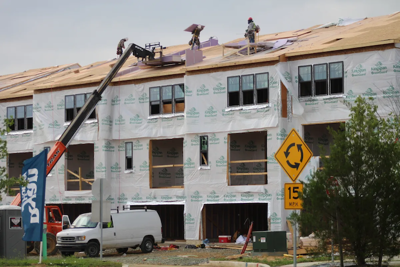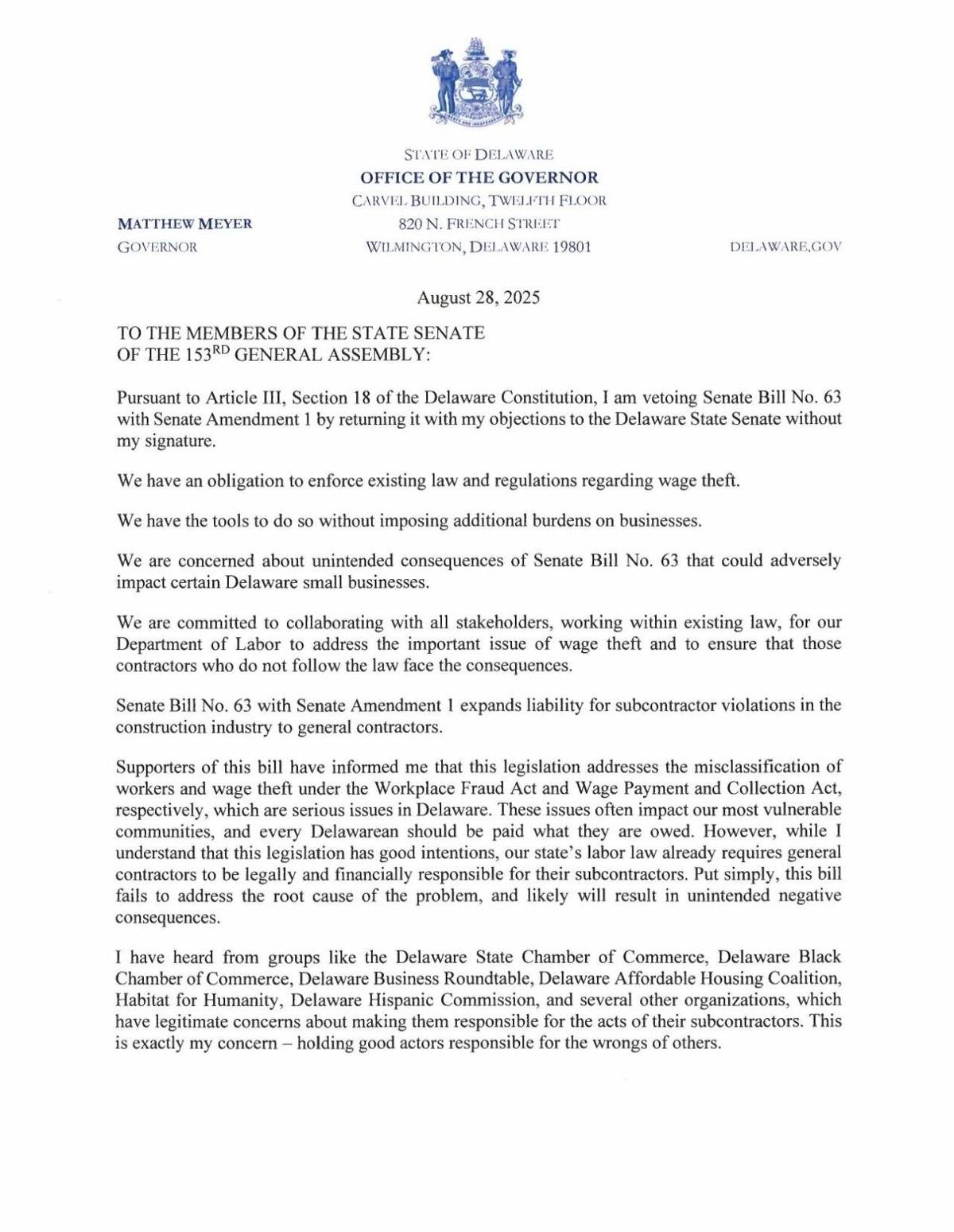(Spotlight Delaware is a community-powered, collaborative, nonprofit newsroom covering the First State. Learn more at spotlightdelaware.org).
Gov. Matt Meyer vetoed a bill Thursday that would put new requirements on how thousands of workers are hired for construction projects, citing concerns over its unintended consequences.
The legislation, Senate Bill 63, aimed to close wage theft loopholes that occur when a general contractor improperly claims as subcontractor as an independent contractor. In doing so, the general contractor does not pay into income tax withholding, unemployment insurance, minimum wage, and workers’ compensation.
The bill would also make general contractors liable for their subcontractors in enforcing those requirements, because currently employers who don’t register as subcontractors cannot be punished by the Department of Labor.
But in his veto letter to legislators, Meyer said that he had concerns over extending liability up to the principals on projects and the potential impact to independent contractors in the state.
“We have an obligation to enforce existing law and regulations regarding wage theft. We have the tools to do so without imposing additional burdens on businesses,” he wrote. “We are concerned about unintended consequences of Senate Bill No. 63 that could adversely impact certain Delaware small businesses.”
Meyer said that he “intends to explore alternative legislative, policy, educational, and enforcement avenues,” and is directing the Department of Labor to prepare a report by the end of this year on how to best address wage theft.
Sponsors decry veto
For the second time in a week, state legislators lambasted the first-term governor for a veto of a bill that was widely passed by his Democratic Party.
In a statement issued Thursday, SB 63 sponsors State Sen. Jack Walsh and House Majority Whip Ed Osienski compared Meyer’s veto, made just days before Labor Day, to attacks on unionized labor by President Donald Trump.
“By vetoing this bill, the Governor has chosen to side with powerful contractor lobbies instead of the thousands of honest workers — many of them immigrants and people of color — who are cheated out of fair pay and basic protections every day. Vetoing it sends a dangerous message — that Delaware will continue to tolerate loopholes that allow bad actors to exploit workers, skirt taxes, and undermine law-abiding contractors who do things the right way,” they wrote.
The veto of SB 63 came alongside another veto of Senate Bill 75, which would have loosened zoning regulations around the state’s marijuana industry. Both have raised the ire of statehouse Democrats, whose relationship with Meyer, a former New Castle County executive, is already particularly strained.
“Now more than ever, Delawareans deserve pro-worker leadership. Workers in our state — union and non-union alike — cannot afford to have their elected leaders show any hesitation on their commitment to expanding worker protections in the face of attacks from the Trump Administration,” Walsh and Osienski wrote.
They are planning to seek support for an override vote on SB 63. The original votes would have been enough to meet the three-fifths requirement, when only one Democrat, State Sen. Russ Huxtable (D-Lewes), opposed the bill.
Advocates see issues
SB 63 saw significant opposition from chambers and industry groups, including the Delaware State Chamber of Commerce, Delaware Black Chamber of Commerce, Delaware Business Roundtable, Delaware Affordable Housing Coalition, Habitat for Humanity, and Delaware Hispanic Commission, They were primarily concerned about the extension of liability to general contractors.
“Delaware is facing a housing crisis. Targeting the state’s longstanding, reputable contractors — many of whom are Chamber members — for the actions of their subcontractors is not a productive solution,” wrote Tyler Micik, government relations director for the state chamber in a June update to members.
The Hispanic Commission took a slightly different view of that balance, saying the joint liability could actually hurt job opportunities for its community.
“While we support the goals of SB 63 in curbing worker misclassification and ensuring compliance with labor laws, the bill’s current structure creates real risks for our immigrant and limited-English-speaking communities. Many Hispanic and Latino individuals – especially those in construction and landscaping – operate as independent contractors out of necessity. This bill could significantly limit their opportunities by discouraging general contractors from working with them due to the risk of joint liability,” the commission wrote to Meyer in June.
Undocumented immigrants are not able to be hired by employers, but they can start their own businesses as independent contractors while they pursue an immigration status. The commission noted that a push toward registering more workers as subcontractors also created real concerns in the Latino community.
“SB 63 proposes the development of a registration system that may serve, in practice, as another database that could be misused to identify undocumented workers. This raises deep concerns from within our community, where fear of enforcement often prevents hardworking residents from seeking opportunities or engaging with public agencies,” the commission wrote.












(0) comments
Welcome to the discussion.
Log In
Keep it Clean. Please avoid obscene, vulgar, lewd, racist or sexually-oriented language.
PLEASE TURN OFF YOUR CAPS LOCK.
Don't Threaten. Threats of harming another person will not be tolerated.
Be Truthful. Don't knowingly lie about anyone or anything.
Be Nice. No racism, sexism or any sort of -ism that is degrading to another person.
Be Proactive. Use the 'Report' link on each comment to let us know of abusive posts.
Share with Us. We'd love to hear eyewitness accounts, the history behind an article.